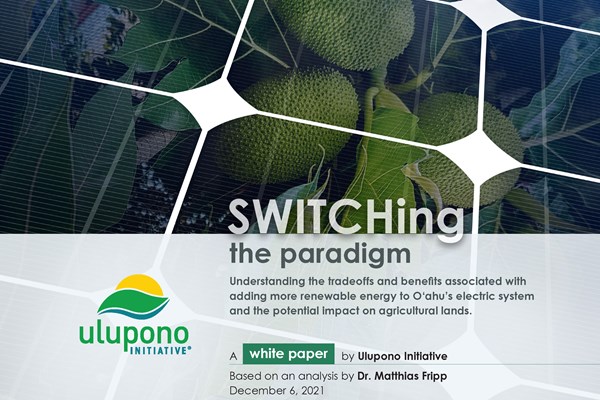White paper aimed at ‘SWITCHing the paradigm’ between solar and ag land use on O‘ahu
Dec 06, 2021

FOR IMMEDIATE RELEASE
HONOLULU — Ulupono Initiative has released a white paper offering an analysis of the benefits and tradeoffs associated with adding more renewable energy onto Oahu’s electric system and its impact on agricultural lands.
Titled “SWITCHing the paradigm,” the paper is based on a recently updated analysis conducted by Dr. Matthias Fripp, associate professor of electrical engineering at the University of Hawaii at Manoa, who used an electricity system planning model called SWITCH (Solar and Wind Energy Integrated with Transmission and Conventional Sources) to evaluate how different land use assumptions would affect land availability, total electric generation costs, and the overall design of the electric system on Oahu.
The intent of the white paper is to foster more productive discussion around the use of limited lands on the island of Oahu to best achieve Hawaii’s declared goals to double local food production by 2030 and produce 100% of the state’s electricity with renewable energy by 2045.
The white paper states:
“When framed as having to choose one goal over the other, the choice can become paralyzing. However, in reality, the development of renewable energy, specifically solar photovoltaics (PV), and protecting Hawaii’s agricultural land do not have to be at odds with each other.
“The following analysis shows that the two can not only coexist but, at times, have a symbiotic relationship that allows us to achieve these ambitious goals simultaneously.”
Read the white paper here: https://online.flippingbook.com/view/272669823/
Download white paper and analysis spreadsheets in PDF: https://www.ulupono.com/project-list/white-paper-switching-the-paradigm/
About Ulupono Initiative
A mission-driven venture of The Omidyar Group, Ulupono Initiative was founded in 2009 to improve the quality of life for the people of Hawaii by working toward sustainable solutions that support and promote locally produced food, renewable energy, clean transportation, and better management of freshwater and waste. For more information, visit ulupono.com or connect with the Ulupono team on Twitter, Facebook, Instagram and LinkedIn.
Categories
- Clean Transportation (114)
- Renewable Energy (76)
- Agriculture Story Series (20)
- Local Food (127)
- News Releases (19)
- Promotions and New Hires (4)
- Less Waste (8)
- Freshwater (23)
- Our Ohana (15)
- In the News (5)
- careers (1)
- Blog (1)
- clean energy (2)
- PUC (2)
- Ulupono Video Podcast Series Talk Story Room (1)
- Bills (1)
- Legislature (1)
- DA BUX (1)
- Electric Vehicle (1)
- Agriculture (3)
- policy (2)

